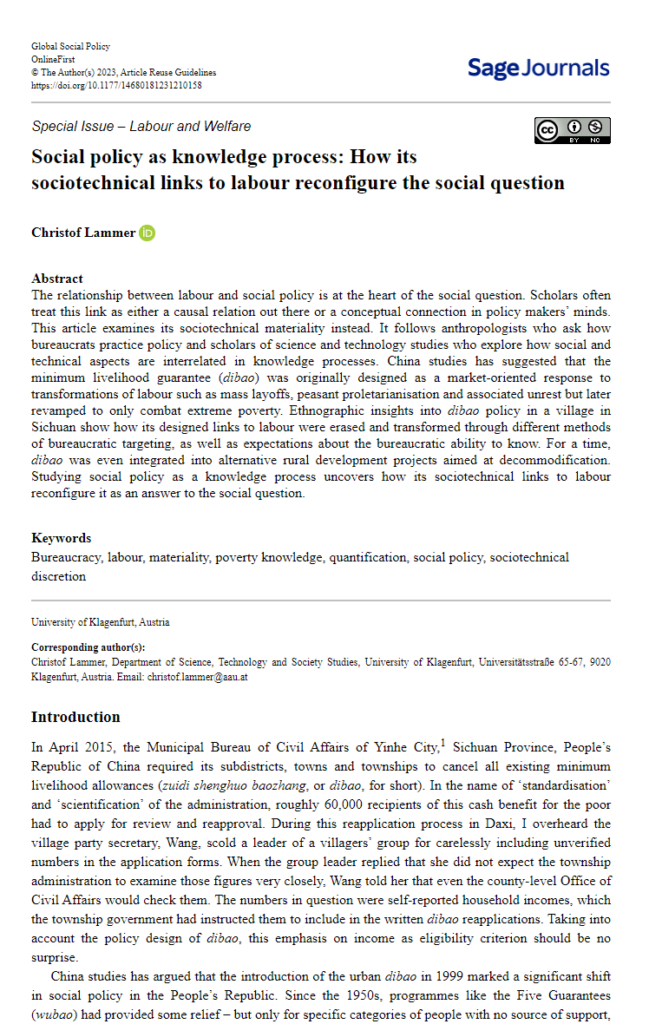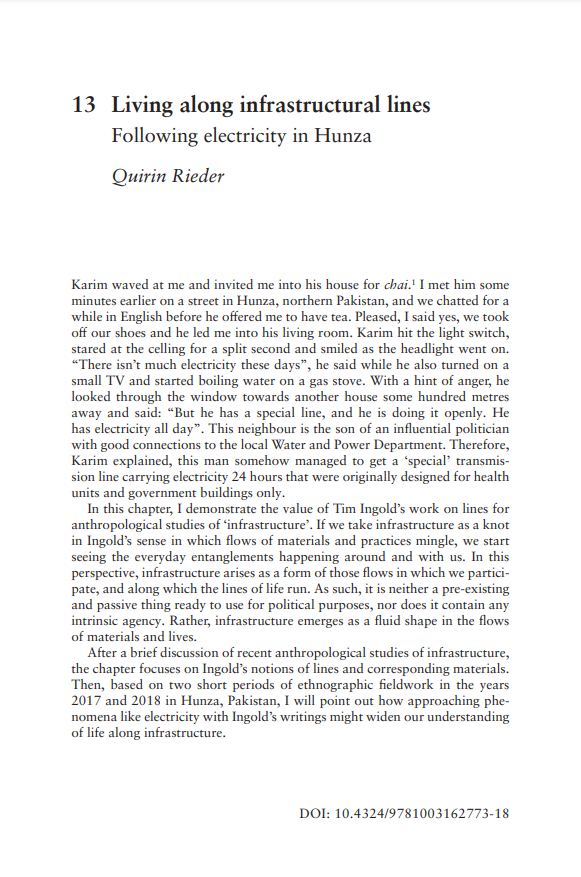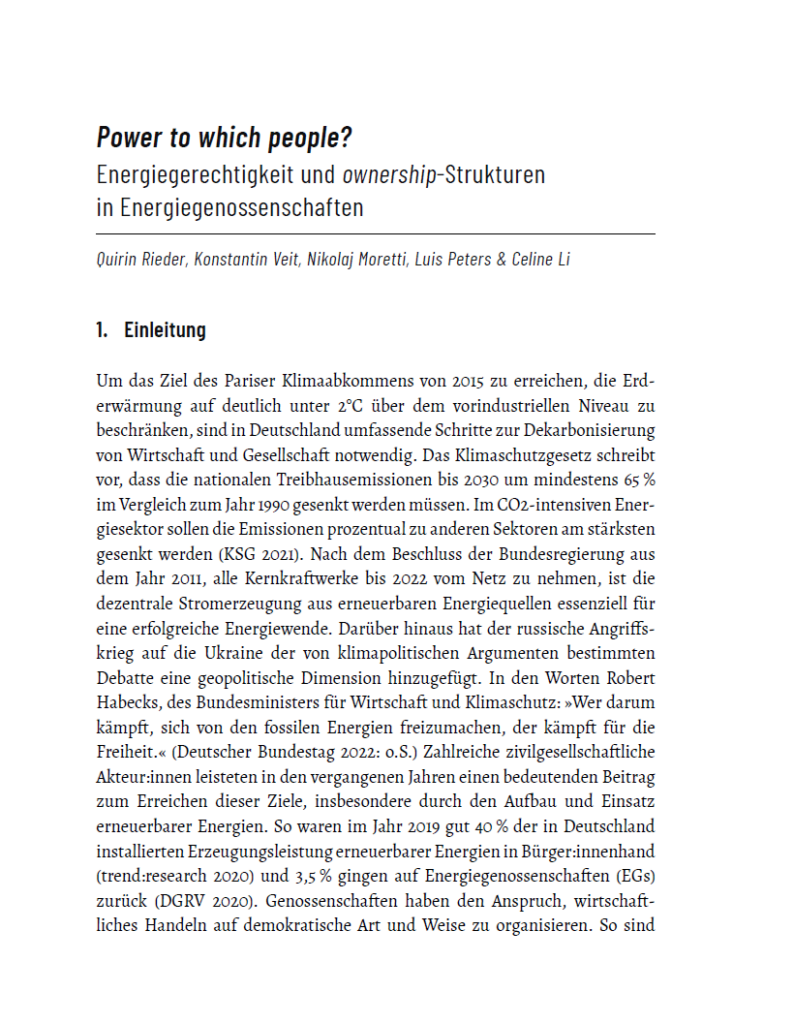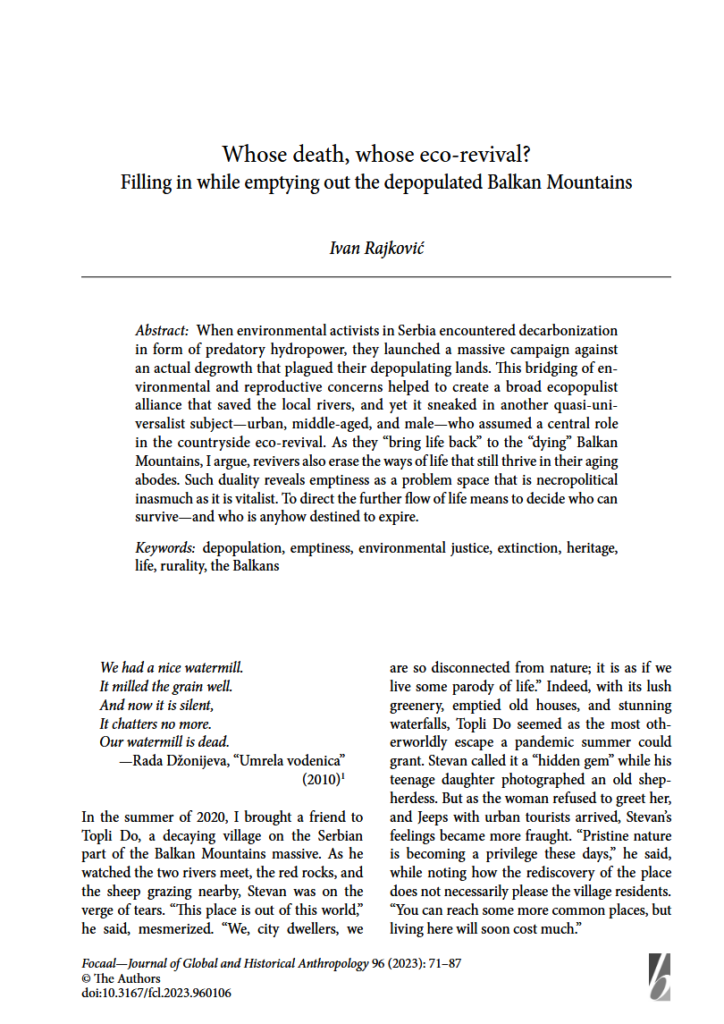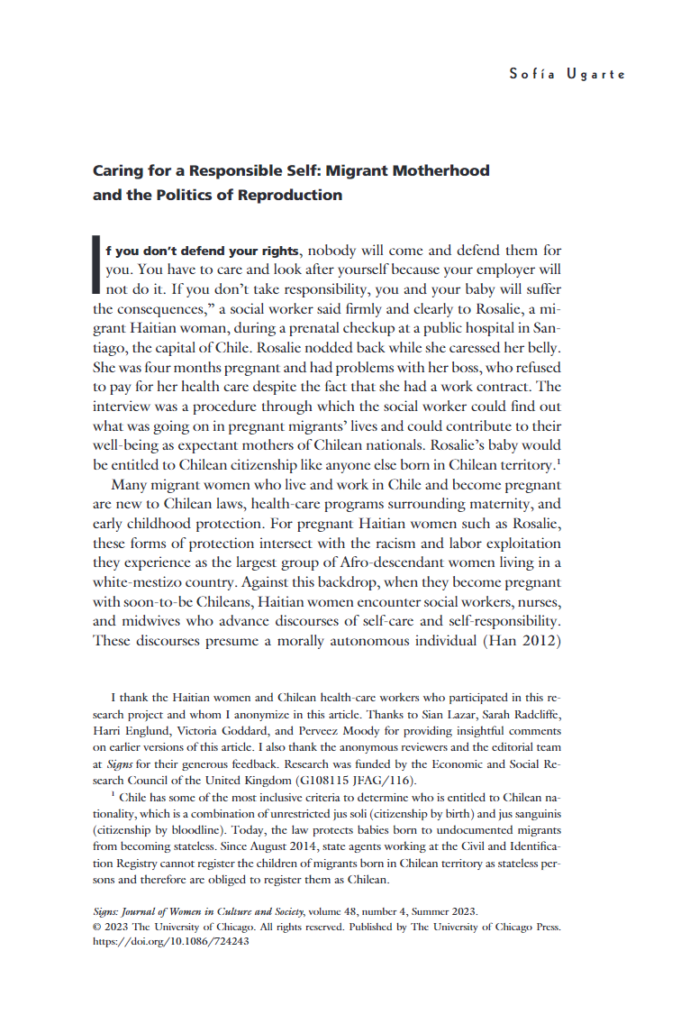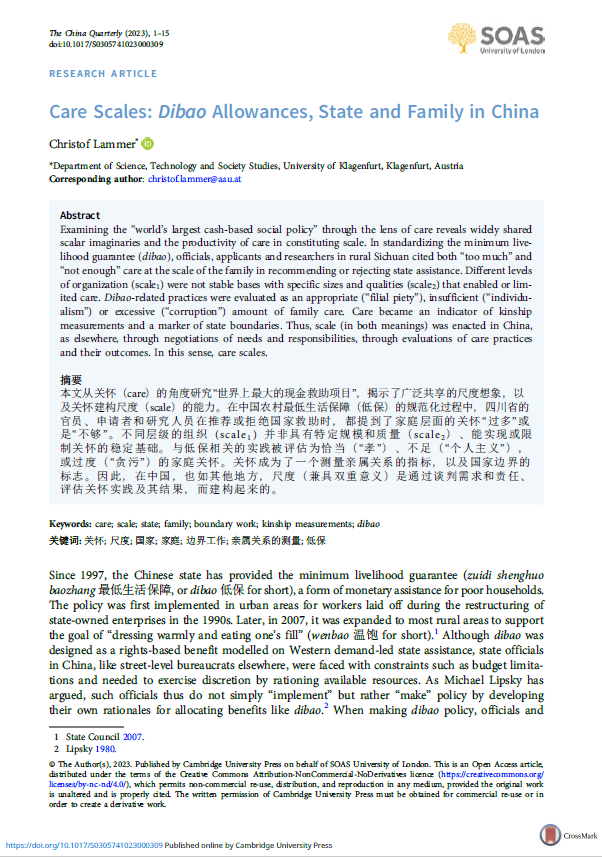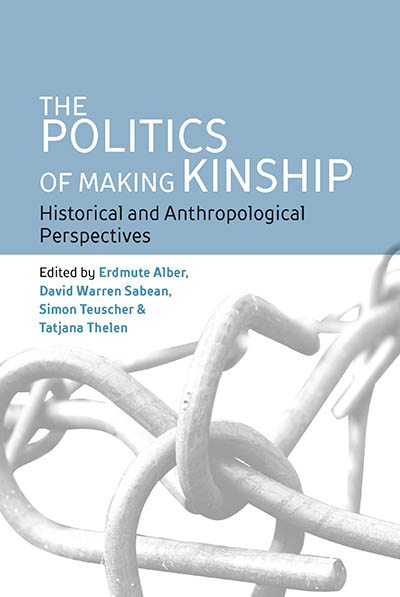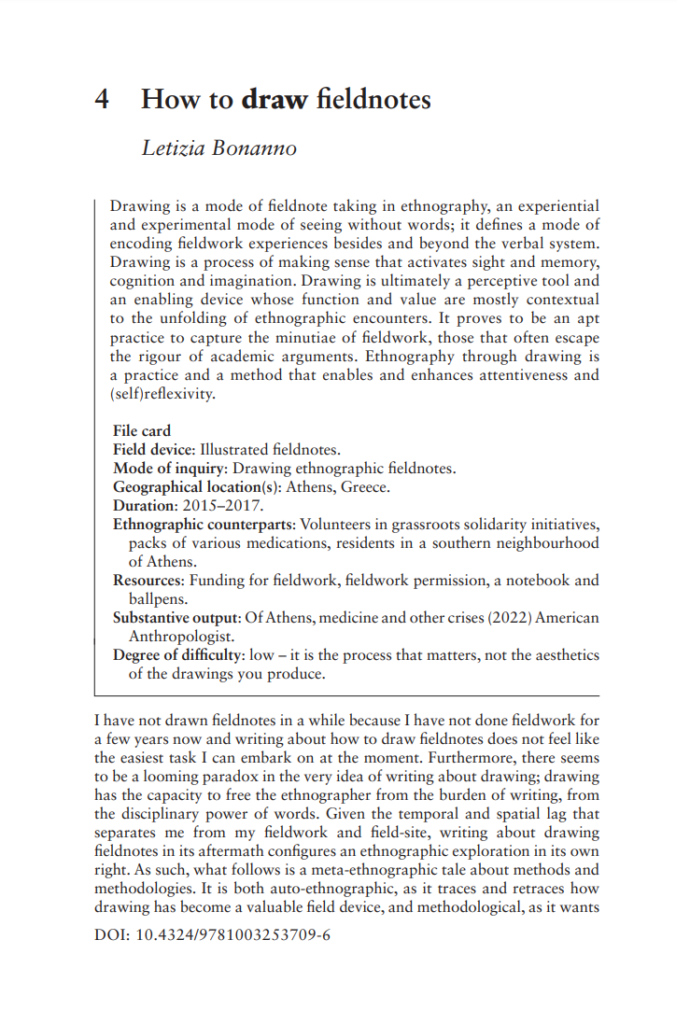Christof Lammer: Social policy as knowledge process: How its sociotechnical links to labour reconfigure the social question. Global Social Policy.
The relationship between labour and social policy is at the heart of the social question. Scholars often treat this link as either a causal relation out there or a conceptual connection in policy makers’ minds. This article examines its sociotechnical materiality instead. It follows anthropologists who ask how bureaucrats practice policy and scholars of science and technology studies who explore how social and technical aspects are interrelated in knowledge processes. China studies has suggested that the minimum livelihood guarantee (dibao) was originally designed as a market-oriented response to transformations of labour such as mass layoffs, peasant proletarianisation and associated unrest but later revamped to only combat extreme poverty. Ethnographic insights into dibao policy in a village in Sichuan show how its designed links to labour were erased and transformed through different methods of bureaucratic targeting, as well as expectations about the bureaucratic ability to know. For a time, dibao was even integrated into alternative rural development projects aimed at decommodification. Studying social policy as a knowledge process uncovers how its sociotechnical links to labour reconfigure it as an answer to the social question.
Quirin Rieder: Living Along Infrastructural Lines. Following Electricity in Hunza, Pakistan
In: Martin Porr & Niels Weidtmann (ed.). One World Anthropology and Beyond: A Multidisciplinary Engagement with the Work of Tim Ingold. London: Routledge. pp. 171–184.
Tim Ingold’s work on lines and the correspondence of materials can contribute to a significant shift of perspectives in the study of infrastructure and built environment. This brief chapter argues for an anthropology of infrastructure that frames its object of analysis neither as a technological manifestation of social action, nor as agency-loaded entity but as a relational everyday phenomenon of experience; a knot, heavily enmeshed in various lines of becoming. Drawing on ethnographic fieldwork in Northern Pakistan, I test Ingold’s concept of lines for studying unequal access to energy. In a context where electricity provision directly relates to a changing environment, the experience of everyday load-shedding (scheduled blackouts) makes melting glaciers as well as failed development schemes very tangible. Here, Ingold’s work may therefore be useful to better understand the (unequal) dimensions of infrastructure development and climate change.
Quirin Rieder: Power to Which People? Energiegerechtigkeit und ownership-Strukturen in Energiegenossenschaften
In: Silja Klepp & Jonas Hein (ed.). Umweltgerechtigkeit und sozialökologische Transformation: Konflikte um Nachhaltigkeit im deutschsprachigen Raum. Bielefeld: transcript. pp. 117–143. –– coauthored with Konstantin Veit, Nikolaj Moretti, Luis Peters and Celine Li.
This co-authored chapter uses an energy justice perspective to show how energy cooperatives in Germany formulate a multi-level critique of large energy corporations and state forms of energy production and grid operation. Comparing two energy cooperatives, we highlight their political work in the wider energy landscape, especially regarding unevenly distributed ownership of the means of production and a lack of participation opportunities. Internally, cooperatives are trying to practice energy-just forms of ownership by creating opportunities for co-ownership and participatory decision-making in infrastructure, while taking energy transition and climate protection in their own hands. However, the chapter also shows that these ideals are not achieved easily, and especially class, financial hurdles, individual time capacities and expertise stand in the way of fully realizing energy-just ownership.
[Chapter in German only | open access]
Ilona Grabmaier: Die Grenzen gegenseitiger Unterstützung: geschlechtsspezifische Konstruktionen von (un)deservingness in der ländlichen Ukraine.
In: Was bleibt von Galizien? Kontinuitäten – Brüche – Perspektiven (= Wiener Galizien-Studien, Bd. 7), edited by D. Lushaj, J. Rozmus, and Y. Remestwenski. V&R unipress, 145–170.
This article is concerned with the question of how it is negotiated whether a person is – or not – eligible for help, support and care within the specific context of female labor migration from Western Ukraine. As will be shown, access to specific resources depends less on formal entitlements and criteria, than on moral views and beliefs about who actually deserves different forms of care. Decisions about the (un)deservingness of a person are established based on concurrently existing logics of legitimization, in which normative notions of reciprocity, kinship, gender, and personality/life course do play a crucial role. These factors determine decisively whether people in Western Ukraine live in secure or insecure environments, especially in old age. Taking as an example the case of Vasyl’, a man in his late sixties who himself claims to be needy, but is classified as undeserving by others, I suggest that not only negative reciprocity within different relationships of mutual support, but especially gendered constructions of care and need contribute significantly to the exclusion of (particularly single) men from these relationships. Thereby, the boundaries between kinship and the state, as well as according (moral) obligations are situationally reworked and (re)negotiated. Fatalism is evoked as a trope to justify the exclusion of some, so that disregard for the neediness of others can be portrayed as the individual failure of those that are excluded. This, in return, serves as a means for claiming inclusion to the „moral center“ of the local community by those denying others care and support which, somehow surprisingly, helps elderly women in considerably gaining power and authority within their communities.
Ivan Rajković: Whose death, whose eco-revival? Filling in while emptying out the depopulated Balkan Moutains.
In: Focaal 96, 71-87.
When environmental activists in Serbia encountered decarbonization in the form of predatory hydropower, they launched a massive campaign against an actual degrowth that plagued their depopulating lands. This bridging of environmental and reproductive concerns helped to create a broad ecopopulist alliance that saved the local rivers, and yet it sneaked in another quasi-universalist subject—urban, middle-aged, and male—who assumed a central role in the countryside eco-revival. As they “bring life back” to the “dying” Balkan Mountains, I argue, revivers also erase the ways of life that still thrive in their aging abodes. Such duality reveals emptiness as a problem space that is necropolitical inasmuch as it is vitalist. To direct the further flow of life means to decide who can survive—and who is anyhow destined to expire.
Sofía Ugarte: Caring for a Responsible Self. Migrant Motherhood and the Politics of Reproduction.
In: Signs. Journal for Women in Culture and Society 48 (4), 969-990.
For Haitian women who live and work in Santiago, expecting a baby entitled to Chilean nationality involves recognizing their maternal bodies at different institutional levels and transforming who they are and how they care for themselves and others as migrants, workers, and mothers in a new country. Based on ethnographic research, this article examines how the pregnant body’s moral legitimacy generates a form of agency among racialized migrant workers who become mothers. Pregnant migrants’ sense of self as working mothers and migrant workers emerges from their embodiment of institutional discourses of self-responsibility and self-care as they navigate contradictory forms of recognition and belonging to the global economy and the nation’s reproduction. The experience of migrant motherhood exposes the lived contradictions inherent in the gendered politics of reproduction. By grounding the meanings of care and social reproduction in migrant selfhood, this analysis expands on the scholarship of gendered migration, and reproductive and care labor, across unequal registers of migrant and nonmigrant livelihoods.
Christof Lammer: Care Scales. Dibao Allowances, State and Family in China. The China Quarterly.
Examining the “world’s largest cash-based social policy” through the lens of care reveals widely shared scalar imaginaries and the productivity of care in constituting scale. In standardizing the minimum livelihood guarantee (dibao), officials, applicants and researchers in rural Sichuan cited both “too much” and “not enough” care at the scale of the family in recommending or rejecting state assistance. Different levels of organization (scale1) were not stable bases with specific sizes and qualities (scale2) that enabled or limited care. Dibao-related practices were evaluated as an appropriate (“filial piety”), insufficient (“individualism”) or excessive (“corruption”) amount of family care. Care became an indicator of kinship measurements and a marker of state boundaries. Thus, scale (in both meanings) was enacted in China, as elsewhere, through negotiations of needs and responsibilities, through evaluations of care practices and their outcomes. In this sense, care scales.
Alexandra Schwell: Invoking urgency. Emotional politics and two kinds of anti-elitism.
In: The Cultural Politics of Anti-Elitism, edited by M. Ege and J. Springer. Routledge, 172-190.
Since the so-called refugee crisis in 2015, notions of urgency and emergency have dominated the vocabulary of Austrian and German populist politics and media, informing not only political debates but also legislations. These discourses create the impression that the influx of refugees is equivalent to a loss of sovereignty over the national territory and the state. In effect, it is argued that the state cannot fulfil its security promise; it is not sovereign anymore unless extraordinary measures are employed. Against the backdrop of the distinction between the two concepts of the “state of exception” and “urgency”, this chapter contributes to the understanding of anti-elitist populism by linking both to the study of emotion. It argues that invoking and declaring “urgency” to prevent or end the “state of exception” is a performative practice that makes a lasting impression on social actors, with far-reaching effects on democratic political culture.
Sofía Ugarte: Racialized positionalities. Ethnographic responsibility and the study of racism and white supremacy.
In: Anthropology and Responsibility, edited by Melissa Demian, Mattia Fumanti, and Christos Lynteris, 128-146.
This chapter reflects on the ways ethnography – both as a mode of conducting research and a genre of writing – becomes destabilized in moments when race is ever more relevant as a historical fact and system of meaning that informs everyday life and the distribution of resources and power. Based on fieldwork with migrant Haitian women looking for work in Chile – a “white-mestizo” country – and their encounters with Chilean nationals in the city of Santiago, I explore the affordances of racialized positionalities in ethnographic research. By looking at how anthropologists can become implicated in perpetuating systems of oppression, I analyze how the dislocations between the anthropology of race and the effects of white supremacy impact how difference and otherness are thought of as integral to anthropology’s epistemic hierarchies and the ways it can transform ethnographic practice. I consider the challenges imposed by racialized positionalities as part of the responsibility of interrogating anthropology’s involvement in systemic forms of racism and white supremacy. In doing so, I propose racialized positionalities as useful ethnographic devices to navigate highly unequal fieldwork settings and examine white supremacy and racism as heterogeneous and relational objects of study that have profound consequences on people’s lives.
Erdmute Alber, David Warren Sabean, Simon Teuscher, and Tatjana Thelen (eds.): The Politics of Making Kinship. Historical and Anthropological Perspectives. New York / Oxford 2023: Berghahn Books.
The long tradition of Western political thought included kinship in models of public order, but the social sciences excised it from theories of the state, public sphere, and democratic order. Kinship has, however, neither completely disappeared from the political cultures of the West nor played the determining social and political role ascribed to it elsewhere. Exploring the issues that arise once the divide between kinship and politics is no longer taken for granted, The Politics of Making Kinship demonstrates how political processes have shaped concepts of kinship over time and, conversely, how political projects have been shaped by specific understandings, idioms and uses of kinship. Taking vantage points from the post-Roman era to early modernity, and from colonial imperialism to the fall of the Berlin Wall and beyond this international set of scholars place kinship centerstage and reintegrate it with political theory.
Tatjana Thelen: The gift as critique – a socialanthropological perspective (in German)
In: Geben, Nehmen, Teilen. Gabenwirtschaft im Horizont der Digitalisierung, edited by Michael Hutter and Birger P. Priddat. Campus Verlag, 65–78.
The gift figures prominently in popular and scientific discourses as critique. This chapter explores how the concept of the gift could develop this political effectiveness, and if under these circumstances it can be still theoretically productive. To do so I trace the origins and different discursive delineations, to show their epistemological pitfalls. In a second step, I demonstrate the flaws of taking classic anthropological texts as (romanticized) alternatives to the capitalist societies. While this has been widely criticized within social anthropology, surprisingly little has changed in contemporary interdisciplinary and popular discourse. Ultimately, I argue that only a new reflexive approach – beyond self-reassurance- can lead to new insights into contemporary processes.
Christof Lammer and André Thiemann (eds.): Infrastructures of Value in Agriculture.
= Special Issue Ethnos.
The special issue shows how infrastructures and practices of infrastructuring shape value of agricultural matter. Ethnographic studies from Australia, China, Moldova, Serbia and Italy examine land’s financialization, terroir wine and its bottles, eco-certification and alternative food networks as well as the interaction between agronomics and cold chains. As material networks, infrastructures facilitate, channel, or hinder circulation—the metamorphoses as well as movement of objects, people, non-human beings and ideas. In doing so, they mediate value: they give actions and their products importance and relevance by materially integrating them into larger wholes. Thereby, this approach brings attention to materiality to David Graeber’s theory of value. The exploration of infrastructures of value thus offers new perspectives for thinking about the production, appropriation and distribution of material wealth.
Letizia Bonanno: How to draw fieldnotes.
In: An Ethnographic Inventory. Field devices for anthropological inquiry, edited by Tomás Sánchez and Adolfo Estalella. Routledge, 52-61.
Drawing is a mode of fieldnote taking in ethnography, an experiential and experimental mode of seeing without words; it defines a mode of encoding fieldwork experiences besides and beyond the verbal system. Drawing is a process of making sense that activates sight and memory, cognition and imagination. Drawing is ultimately a perceptive tool and an enabling device whose function and value are mostly contextual to the unfolding of ethnographic encounters. It proves to be an apt practice to capture the minutiae of fieldwork, those that often escape the rigour of academic arguments. Ethnography through drawing is a practice and a method that enables and enhances attentiveness and (self)reflexivity.
Letizia Bonanno and Cosmin Popan: Delivering precarity.
In: Otherwise Magazine.
The gift figures prominently in popular and scientific discourses as critique. This chapter explores how the concept of the gift could develop this political effectiveness, and if under these circumstances it can be still theoretically productive. To do so I trace the origins and different discursive delineations, to show their epistemological pitfalls. In a second step, I demonstrate the flaws of taking classic anthropological texts as (romanticized) alternatives to the capitalist societies. While this has been widely criticized within social anthropology, surprisingly little has changed in contemporary interdisciplinary and popular discourse. Ultimately, I argue that only a new reflexive approach – beyond self-reassurance- can lead to new insights into contemporary processes.
Vincent Dubois (ed.): Bringing Bourdieu’s Theory of Fields to Critical Policy Analysis.
Fully revised translation, Edward Elgar, forthcoming, 2023.
Laying down the foundations of a critical sociological approach to the interdisciplinary domain of public policy, this insightful book presents the first systematic reflection on the use of Bourdieu’s theory of social fields to analyse policy processes. Engaging with theoretical dimensions, it provides innovative methodological tools, both quantitative and qualitative in nature. Bringing together an array of eminent contributors and case studies from across the globe, it presents theoretical and methodological insights, as well as empirical information on national cases and policy sectors.
